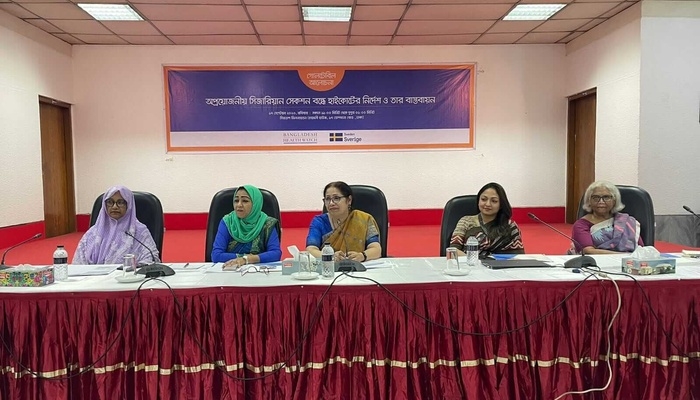

It is reported in different newspapers that Bangladesh is facing a massive boom in the number of medically unnecessary C-sections. Between 2016 and 2018 the number of operations increased by 51 per cent. The percentage is higher in private and NGO-based facilities, at 83.70 and 43.90 percent respectively, compared to public facilities. (The Daily Star, Sep 29, 2022).
The rate of caesarian deliveries has increased almost eight-fold in Bangladesh. In 2004, the rate stood at four percent. However, a recent analysis revealed that the rate was found to be 33 percent in 2017-18, which is more than double the rate recognized by WHO as a benchmark. Understanding the necessity for advocating the current issue, Bangladesh Health Watch organized a round table discussion on Prevention of Medically Unnecessary Caesarean Section at CIRDAP Auditorium in the capital, on 17th of September. The roundtable discussion was titled “High Court Directive on Stopping Unnecessary Cesarean Section and its Implementation”.
Prof. Farhana Dewan, President, Obstetrical and Gynecological Society of Bangladesh (OGSB) and Barrister Rashna Imam, Advocate, Supreme Court of Bangladesh and Member, Advisory Group, Bangladesh Health Watch presented keynotes in the round table discussion. The session was moderated by Dr Shehlina Ahmed, Working Group Member, Bangladesh Health Watch.
Farhana Dewan sheds light on the role of service-providers in this sector in stopping unnecessary caesarean sections in her presentation. On the other hand, Rashna Imam highlighted the legal aspects of this issue in her presentation.
Discussing the current context of C-section, she said that "C-section is happening more in the private sector. Even among those who are educated and employed, the prevalence of C-section is high. The presentation also revealed that the rate of C-section in Bangladesh is highest in Khulna region.
Barrister Rashna Imam, in her speech highlighted why caesarean section is unnecessary. Barrister Rashna Imam said, "Caesarean section is done to save mother’s life, but even though the rate of caesarean section is so high, the maternal mortality rate is not decreasing, and we think that these C-sections are unnecessary for not reducing this mortality rate.”
In her presentation, Barrister Imam talked about Article 31 of the Constitution which states the “Right to Life.” Although health is not directly recognized as a fundamental right in the constitution, it has been identified as a fundamental right in various ways.
Rashna Imam also said that if Bangladesh wants to achieve Universal Health Coverage (UHC), maternal health should be given more importance as without it, we cannot achieve our UHC goal. We should see that no woman should be a victim of any kind of discrimination in getting any kind if health services.
Barrister Imam urged the government to ensure proper implementation of the law and bring the private sector under all kinds of surveillance.
Bangladesh exceeds the standards set by its neighbors as well, in this regard. The rate of caesarean delivery was found to be 22 percent in India (2019-2021), 22 percent in Pakistan (2017-2018), 16 percent in Nepal (2016) and 17 percent in Myanmar (2015-16).
Reputed public health experts such as Dr. Halida Hanum, former President of OGSB Ferdousi Begum, General Secretary Salma Rouf, lawyers, government officials, teachers, journalists, development workers such as Afsana Karim, Selina Amin, Sharmina Rahman, Abu Jamil Faisal, Dr. Sukumar Sarkar, Samia Afrin and others participated in this open discussion.
Speakers at the meeting said that laws should be made to prevent caesarean sections in private clinics that do not have labor rooms.
Various reports and research findings have shown that the prevalence and rate of C-sections has increased in rural areas as well as in urban areas. Therefore, awareness campaign activities among these people are necessary to stop unnecessary C-sections. In this regard, local civil society organizations like Bangladesh Health Watch can play an important role. While talking this issue, speakers stressed upon capacity building training for midwives.
Speakers in the discussion emphasized the importance of conveying the guidelines formulated by the relevant authorities to all the individuals and organizations involved in the health sector in view of the High Court's directives.
Background of PIL
In June 2019, the Honorable High Court issued a rule in Writ Petition No. 7117/2019 upon (1) the Secretary, Ministry of Health and Family Welfare, (2) Director General, Directorate of Health Services, (3) President, Bangladesh Medical and Dental Council (respondents) to show cause as to why their failure to regulate private and public hospitals, clinics and medical practitioners to prevent medically unnecessary C-sections should not be declared to be without any lawful authority and of no legal effect. A division bench comprising Mr. Justice Moyeenul Islam Chowdhury and Mr. Justice Md. Ashraful Kamal issued the rule.
The Hon’ble Court further passed an interim order directing the respondents to form a committee of relevant stakeholders within one month and formulate guidelines for prevention of medically unnecessary C-sections and submit the said guidelines in court within six months.
The PIL was filed due to the failure of the respondents to effectively regulate private and public maternal health care service providers (clinics, hospitals, and medical practitioners) in Bangladesh to prevent medically unnecessary caesarean sections.
Now this is a high time to look back to the progress of the situation and take further necessary steps to prevent medically unnecessary caesarean sections. Henceforth Bangladesh Health Watch being a watchdog body to raise the critical public health issues to the attention of policy makers and the actors in the health sector considers arranging the Roundtable Meeting on Preventing Medically Unnecessary Caesarean Sections.
Citizen's Voice